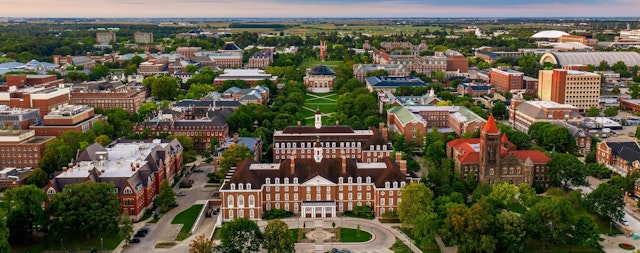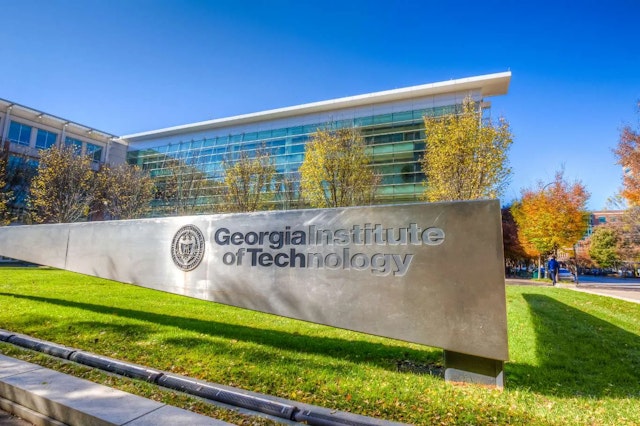What do Tesla’s self-driving cars, Meta’s Metaverse, and Amazon’s Alexa have in common? Behind each of them are brilliant researchers, most holding a PhD in artificial intelligence.
A PhD in artificial intelligence isn’t the only way to get to the vanguard of tech R&D — there are lots of opportunities for those holding master’s degrees, for example — but those who want to head up the most advanced, influential artificial intelligence research projects have likely spent 5-7 years of their lives in a leading university’s computer science program completing the coursework, qualifying exams, and independent research needed to earn the world’s highest academic credential.
Understandably, these kinds of programs are increasingly gaining popularity. Indeed, the percentage of graduating computer science PhDs who specialize in artificial intelligence and machine learning has grown dramatically over the last ten years: Stanford’s AI Index reports that such students made up over 20% of all CS PhD students in 2019, up 8.6% from 2010 and dwarfing all other CS specializations.
At the same time, pursuing a PhD in artificial intelligence remains an exclusive club. With the rigorous requirements and lengthy time-to-degree (generally 4-5 years), it’s no surprise that the same survey counted less than 300 new PhD students specializing in AI or ML graduating from American computer science departments in 2019.
If you’re considering pursuing becoming one of these new AI PhDs, you’re in the right place. This guide will give you all you need to know to determine if a doctoral study in artificial intelligence is right for you, including minimum requirements for admission, typical employment opportunities and salaries upon graduation, and what to expect from a doctoral course of study. In the end, we’ll unveil our picks for the top artificial intelligence PhD programs.
What is a PhD in artificial intelligence?
A doctoral degree (often referred to by the shorthand PhD, Ph.D., DPhil, for “Doctor of Philosophy”) is generally considered the highest academic degree and almost always requires original research. While many researchers working in artificial intelligence hold PhDs, it’s actually quite rare to earn a PhD in artificial intelligence. More frequently, students enter doctoral programs in computer science where they focus on artificial intelligence.
What does an artificial intelligence PhD program entail?
Doctoral programs differ between schools and between countries. In the US, they generally last between 5 and 7 years, during which the vast majority of students receive full fellowships that include tuition remission and a small stipend to cover living costs. To earn the doctorate, students must fulfill the following general requirements:
Coursework
In the early years of their program, students will take graduate-level courses in computer science, applied mathematics, and topics in artificial intelligence. Sometimes, these will include remedial courses in programming or mathematics.
Graduate-level courses might include:
Randomness and Computation
Statistical Learning Theory
Natural Language Processing
Human-Computer Interaction Research
Deep Learning
Data Mining
Qualifying Examinations
Doctoral students usually have to take two sets of examinations throughout their program. While different schools have different names for these oral and written examinations (qualifying exams, comprehensive exams, preliminary exams, etc.), they are typically consistent in their purpose. The first set of exams (breadth exams) is meant to ensure a student has a sufficient grasp of the field of computer science as a whole. The second set of exams (depth exams) is meant to ensure a student has developed expertise in relevant areas of the discipline to support their research.
Dissertation Proposal & Defense
After successfully passing the second set of exams, a doctoral student begins writing a dissertation proposal that lays out the purpose, methodology, and anticipated next steps of their research, plus a summary of any research to date. After successfully defending this proposal in front of some or all of the members of their dissertation committee, the student is considered ABD — or “all but dissertation” — and can begin writing. Some also consider completion of this phase the beginning of a student’s doctoral “candidacy.”
Dissertation & Defense
In the final years of their programs, PhD candidates write their dissertations and prepare to defend them in front of a committee of scholars assembled from their departments and the field as a whole. Sometimes candidates also give a public defense for their colleagues, friends, and family.
After successfully defending, incorporating any changes, and depositing their dissertation with their university’s dissertation office, students are awarded their PhD. Throughout their program, these students will likely have received one or two master’s degrees “en route” to this terminal degree.
What types of jobs does an artificial intelligence PhD qualify you for?
Ten years ago, almost half of AI PhDs stayed in academia. But while universities have expanded their AI offerings over the last decade, growth in faculty headcount hasn’t kept pace with the surge in doctoral students. Instead, many newly minted PhDs have been gravitating towards industry, which offers a better (though still competitive) job market and, often, astronomic compensation in comparison. Today, in fact, the share of new AI PhDs entering industry jobs has grown to almost triple the share remaining in academia.

Image Credit: AI Index
Academia
Those who stay in academia usually do so because they enjoy teaching, enjoy the freedom to pursue research interests independent of corporate interests, like the flexibility of an academic schedule, want the security of tenure (for-life academic appointments), or a combination of these.
While many artificial intelligence researchers will pursue post-doctorates (post-docs) after they finish their PhDs where they receive research stipends in exchange for teaching a reduced course load, their ultimate goal will typically be landing a tenure-track assistant professorship at a college or university. In the US, the average salary for an assistant professor in computer science is $86,892. Over time, and after completing the often arduous tenure process, an AI academic can expect to rise to the rank of associate professor, and, eventually, full professor, for which the average salary is $121,458.
As you’ll see, these salaries are substantially lower than what an AI PhD can earn in industry — but this doesn’t mean that academic positions are any less competitive. While universities are rushing to add AI faculty to provide training for interested undergraduate and graduate students, job openings aren’t keeping pace with the increasing number of PhDs these programs are pumping out. If anything, tenure-track professorships in computer science departments are more competitive than they have been in the past.
Industry
In industry, artificial intelligence PhDs often find roles as high-level machine learning engineers, research scientists, or research directors in tech companies or labs like Google’s DeepMind and Meta AI. In these positions, they typically undertake, design, and/or direct research to support new products, features, or other initiatives.
Competition for these roles is fierce, in part because compensation, though it can vary widely, is consistently high. An “entry-level” PhD research scientist at Google, for example, can expect to earn $126,000-$190,000 plus bonus, equity, and benefits. In some cases, according to AI Paygrades, PhD research scientists at top tech companies can earn close to or more than $1,000,000 annually — though, of course, these jobs are few and far between.
Who should consider an artificial intelligence PhD?
Artificial intelligence PhD programs offer students the opportunity to deepen their knowledge of artificial intelligence and machine learning, engage in cutting-edge research, and set themselves up for success in their professional lives — so it’s not surprising that top schools get thousands of applications for the very limited number of spots they have to fill each year.
Top programs typically require applicants to have a solid foundation in applied mathematics, computer science, or a related STEM field. As doctoral students generally earn relevant master’s degrees throughout their PhD studies, schools won’t require applicants hold advanced degrees, instead admitting students right out of undergrad. As with any degree program — and especially one offered by an elite university — successful applicants will have stellar academic records and, if required, strong test scores. They’ll also generally already be able to articulate the kind of research they wish to undertake, and why a specific school and its faculty would provide a suitable environment for this research.
Of course, whether you satisfy the minimum requirements to apply and whether you should apply are two different questions. AI doctoral programs are extraordinarily rigorous, and in competing against their peers for attention from professors and, ultimately, in the job market, PhD students compete against some of the most brilliant minds out there. Doctoral study in AI also requires considerable passion and discipline: it’s the PhD student themselves who will be responsible for designing a multi-year research project and working the long hours to complete it.
Ultimately, only you can determine whether you can succeed in that environment and if the enhanced job prospects available to AI PhDs will make 5-7 years in graduate school subsisting on a meager salary worth it.
If you do decide to apply, you’ll generally be required to include the following in your application:
Undergraduate transcripts
GRE scores
Resume or curriculum vitae
Statement of purpose outlining research interests and why a particular school is a good match
Up to three letters of recommendation
For international students, evidence of English proficiency
What factors should you consider when researching artificial intelligence PhD programs?
When researching artificial intelligence PhD programs, students should consider the following factors:
Department Profile
While you can expect undergraduate and master’s programs to have fairly consistent curricula, at the doctoral level the research profile of the department as a whole — an emphasis on computer vision, for example — really starts influencing the kind of research you can undertake there. Oftentimes, a department’s profile is evident from its website, faculty, and course offerings, but don’t hesitate to reach out to an admissions officer to inquire whether their strengths might be a good match for your interests.
Faculty
Core to ensuring a program matches your interests is ensuring that there are faculty members in the department who work in your desired subject areas. More so than in undergraduate and master’s programs, PhD students work closely with their department’s faculty, often on a first-name basis. In the end, a successful dissertation comes down in large part to having a successful relationship with your faculty advisor. As you look into different programs, see if any faculty members have similar interests to you, and, again, don’t hesitate to get into contact with any questions you have.
Industry Relationships
One of a program’s biggest advantages comes in the industry relationships they cultivate. These relationships yield not only internship opportunities, but potentially also job pipelines. When looking at programs, check to see if they’ve listed industry relationships on their website, or email the department directly to inquire. Failing this, you might take to LinkedIn to see whether alumni list internships they had during their studies. Often, this can be a good indicator that there is an existing relationship between a school and the company.
Location
The location of an AI PhD program is important for the kinds of industry relationships available, but, perhaps more importantly, it’s important because you will be spending a considerable portion of your life there. As you research, be realistic about whether you want to spend 5-7 years in a city. You might also take into account a city’s cost of living, knowing that your only income as you are completing your doctorate will likely be your stipend.
Top PhD programs in artificial intelligence
Given that each doctoral student will complete independent research that is meant to meaningfully contribute to existing scholarship, choosing an AI PhD program is far more of an individual decision than choosing a bachelor’s or master’s program. At the same time, there are certain computer science departments considered leaders in the field not just by fellow academics, but by corporate recruiters as well. We’ve listed them below in no particular order.

Stanford University
Stanford, California
Founded in 1965, Stanford’s Computer Science Department houses one of the highest-regarded AI programs in the country. The Stanford Artificial Intelligence Laboratory (SAIL), founded three years prior in 1962, has been considered among the most innovative AI labs for over 50 years. Faculty focus areas include computational biology, computer vision, machine learning, natural language processing, and robotics.

University of Washington
Seattle, Washington
The University of Washington’s Paul G. Allen School of Computer Science & Engineering has consistently been considered one of the top computer science programs worldwide, with over 2,500 applications submitted annually for 50-60 available spots. The UW AI group focuses on machine learning, natural language processing, probabilistic reasoning, and machine reading, augmented planning and control, and computational biology, among other areas.

Cornell University
Ithaca, NY
Cornell’s Computer Science Department offers PhD studies on its Ithaca campus nestled in New York State’s Finger Lakes region, as well as on Roosevelt Island in New York City. Around 30 to 40 PhD students join the program annually. Those that choose to focus on artificial intelligence are supported by a small, but accomplished AI faculty who focus on areas such as knowledge representation and reasoning, natural language processing, machine learning (the largest group), and game and decision theory with application to economics.

University of California—Berkeley
Berkeley, California
Berkeley’s Computer Science Division boasts of being one of the best in the country, with many PhD students going on to join the faculties of leading universities. Its AI PhD program, centered around the Berkeley Artificial Intelligence Research Lab (BAIR), focuses on core areas like deep learning, knowledge representation, robotics, and natural language processing, and emphasizes applying advances in AI and machine learning to real-world problems in interdisciplinary research.

The University of Illinois at Urbana–Champaign
Champaign, Illinois
Featuring a diverse, growing AI program housed on the University of Illinois’ flagship campus, the Grainger College of Engineering’s Computer Science Department specializes in computer vision, machine listening, natural language processing, machine learning, and robotics. UI additionally houses the Center for Artificial Intelligence Innovation, which spearheads advanced AI initiatives.

Carnegie Mellon University
Pittsburgh, Pennsylvania
Considered the birthplace of artificial intelligence, Carnegie Mellon University’s world-renowned School of Computer Science allows interested graduate students to undertake artificial intelligence research en route to a PhD in computer science with an optional certificate in the neural basis of cognition, while others have the opportunity to pursue PhDs in areas like language and information technologies, machine learning, or even joint PhDs in machine learning and public policy, neural computation, or statistics.

Georgia Institute of Technology
Atlanta, Georgia
Georgia Tech’s artificial intelligence and machine learning program has wide-ranging foci, including models of human-level intelligence, intelligent tutoring, self-aware systems, predicting human behavior, automating creativity, and many more. Students have the opportunity to pursue a PhD in computer science, robotics, human-centered computing, or machine learning.